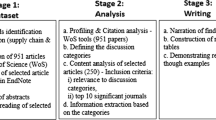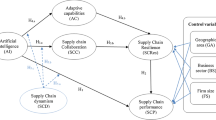Abstract
Based on relational exchange theory and transaction cost theory, a conceptual model for the relationships among supply chain partnership, inter-organizational knowledge trading and enterprise innovation performance is proposed and empirically tested using the data collected from 256 Chinese manufacturing enterprises in project-based supply chain with the structural equation model. The dimension of supply chain partnership in this model is described from shared goal, trust and relationship commitment. Inter-organizational knowledge trading is categorized into explicit knowledge trading and tacit knowledge trading. The results showed that: (1) there are significant and positive effects of shared goal and trust on explicit knowledge trading, tacit knowledge trading and enterprise innovation performance, while trust has a stronger positive effect on tacit knowledge trading than explicit knowledge trading; (2) although relationship commitment has significant and positive effects on tacit knowledge trading and enterprise innovation performance, it does not affect explicit knowledge trading significantly; (3) it is also proved that inter-organizational knowledge trading (explicit knowledge trading and tacit knowledge trading) has significant and positive effects on enterprise innovation performance; (4) the mediating effects of inter-organizational knowledge trading (explicit knowledge trading and tacit knowledge trading) are proved on the relationships between supply chain partnership (shared goal, trust and relationship commitment) and enterprise innovation performance, excluding the mediating effect of explicit knowledge trading between relationship commitment and enterprise innovation performance. The findings provide a theoretical basis for inter-organizational knowledge trading participants selecting an appropriate relational mechanism to promote knowledge trading, and these also guide the inter-organizational knowledge trading among members of project-based supply chain in practice.


Similar content being viewed by others
References
Ajmal MM, Koskinen KU (2008) Knowledge transfer in project-based organizations: an organizational culture perspective. Project Manag J 39:7–15. https://doi.org/10.1002/pmj.20031
Ambrose M, Hess RL, Ganesan S (2007) The relationship between justice and attitudes: an examination of justice effects on event and system-related attitudes. Organ Behav Hum Decis Process 103:21–36. https://doi.org/10.1016/j.obhdp.2007.01.001
Anderson JA, Faff RW (2008) Point and figure charting: a computational methodology and trading rule performance in the s&p 500 futures market. Int Rev Financ Anal 17:200–217. https://doi.org/10.1016/j.irfa.2004.08.002
Bagozzi RP, Yi Y (1988) On the evaluation of structural equation models. J Acad Mark Sci 16:74–94. https://doi.org/10.1007/bf02723327
Brydon M, Aidan R (2006) Understanding the failure of internal knowledge markets: a framework for diagnosis and improvement. J Inf Manag 43:964–974. https://doi.org/10.1016/j.im.2006.09.001
Chen YZ, Chen W (2019) Incentive contracts of knowledge investment for cooperative innovation in project-based supply chain with double moral hazard. Soft Comput 23:1–10. https://doi.org/10.1007/s00500-019-03894-8
Chen W, Yang B, Lin C (2016a) Partner selection mechanism of cooperative innovation in project-based supply chain based on the effect of knowledge level. Adv Model Anal B 59:146–163
Chen W, Yang B, Peng C (2016b) Knowledge trading in supply chain partnerships:the role of trust and relationship commitment. Int J u- and e- Serv Sci Technol 9:295–310
Chiu CM, Hsu MH, Wang ETG (2006) Understanding knowledge sharing in virtual communities: an integration of social capital and social cognitive theories. Decis Support Syst 42:1872–1888. https://doi.org/10.1016/j.dss.2006.04.001
Chow WS, Chan LS (2008) Social network, social trust and shared goals in organizational knowledge sharing. Inf Manag 45:458–465. https://doi.org/10.1016/j.im.2008.06.007
Das TK, Teng BS (1998) Between trust and control: developing confidence in partner cooperation in alliances. Acad Manag Rev 23:491–512. https://doi.org/10.5465/AMR.1998.926623
Davenport TH, Prusak L (1998) Working knowledge. Harvard Business School Press, Boston, pp 67–78
David TR, Lakemond N, Melander L (2017) Integrating supplier knowledge in new product development projects: decoupled and coupled approaches. J Knowl Manag 21:1035–1052. https://doi.org/10.1108/JKM-10-2016-0438
Desouza KC, Awazu Y, Yamakawa S (2005) Facilitating knowledge management through market mechanism. Knowl Process Manag 12:99–107. https://doi.org/10.1002/kpm.226
Doney PM, Cannon JP (1997) An examination of the nature of trust in buyer-seller relationships. J Mark 61:35–51. https://doi.org/10.1177/002224299706100203
Donselaar KV, Kopczak LR, Wouters M (2001) The use of advance demand information in a project-based supply chain. Eur J Oper Res 130:519–538. https://doi.org/10.1016/S0377-2217(99)00411-7
Dyer JH, Singh H (1998) The relational view: cooperative strategy and sources of inter-organizational competitive advantage. Acad Manag Rev 23:660–679. https://doi.org/10.5465/AMR.1998.1255632
Ellram LM (1991) Supply-chain management: the industrial organization perspective. Int J Phys Distrib Log Manag 21:13–22. https://doi.org/10.1108/09600039110137082
Eriksson PE (2013) Exploration and exploitation in project-based organizations: development and diffusion of knowledge at different organizational levels in construction companies. Int J Project Manag 31:333–341. https://doi.org/10.1016/j.ijproman.2012.07.005
Estrada I, Faems D, Faria PD (2016) Coopetition and product innovation performance: the role of internal knowledge sharing mechanisms and formal knowledge protection mechanisms. Ind Mark Manag 53:56–65. https://doi.org/10.1016/j.indmarman.2015.11.013
Gefen D, Karahanna E, Straub DW (2003) Trust and TAM in online shopping: an integrated model. MIS Q 27:51–90. https://doi.org/10.2307/30036519
Han W, Yuan H, Macbeth D (2017) Performance measurement of cross-culture supply chain partnership: a case study in the Chinese automotive industry. Int J Prod Res 56:1–15. https://doi.org/10.1080/00207543.2017.1377357
Hitt MA, Ireland RD, Lee HU (2000) Technological learning, knowledge management, firm growth and performance: an introductory essay. J Eng Technol Manag 17:231–246. https://doi.org/10.1016/s0923-4748(00)00024-2
Inkpen AC (2008) Knowledge transfer and international joint ventures: the case of NUMMI and General Motors. Strateg Manag J 29:447–453. https://doi.org/10.2307/20142029
Inkpen AC, Tsang EWK (2005) Social capital, networks, and knowledge transfer. Acad Manag Rev 30:146–165. https://doi.org/10.5465/AMR.2005.15281445
Inkpen AC, Minbaeva D, Tsang EWK (2019) Unintentional, unavoidable, and beneficial knowledge leakage from the multinational enterprise. J Int Bus Stud 50:250–260. https://doi.org/10.1057/s41267-018-0164-6
Karande K, Ha J, Singhapakdi A (2008) The role of contextual factors in relationship commitment of buyers to foreign suppliers: a survey of korean importers. Ind Mark Manag 37:856–862. https://doi.org/10.1016/j.indmarman.2008.01.010
Kim SY, Nguyen VT (2018) A structural model for the impact of supply chain relationship traits on project performance in construction. Prod Plan Control 29:170–183. https://doi.org/10.1080/09537287.2017.1398846
Kucharska W (2018) Relationships between Trust and Collaborative Culture in the Context of Tacit Knowledge Sharing. Soc Sci Electronic Publ 13:61–78. https://doi.org/10.7341/20171344
Květoň V, Kadlec V (2018) Evolution of knowledge bases in European regions: searching for spatial regularities and links with innovation performance. Eur Plan Stud 26:1–23. https://doi.org/10.1080/09654313.2018.1464128
Laeequddin M, Sahay BS, Sahay V (2010) Measuring trust in supply chain partners’ relationships. Meas Bus Excell 14:53–69. https://doi.org/10.1108/13683041011074218
Lagace RR, Gassenheimer DJB (1991) The relevance of ethical salesperson behavior on relationship quality: the pharmaceutical industry. J Pers Selling Sales Manag 4:39–47. https://doi.org/10.2307/20832471
Lai XD, Wu GD, Shi JG (2015) Project value-adding optimization of project-Based supply chain under dynamic reputation incentives. Int J Simul Model 14:121–133. https://doi.org/10.2507/IJSIMM14(1)CO1
Lambert DM, Emmelhainz MA, Gardner JT (1996) Developing and implementing supply chain partnerships. Int J Logist Manag 7:1–18. https://doi.org/10.1108/09574099610805485
Lane PJ, Salk JE, Lyles MA (2001) Absorptive capacity, learning, and performance in international joint ventures. Strateg Manag J 22:1139–1161. https://doi.org/10.1002/smj.206
Le PB, Lei H (2018) The mediating role of trust in stimulating the relationship between transformational leadership and knowledge sharing processes. J Knowl Manag 22:521–537. https://doi.org/10.1108/JKM-10-2016-0463
Li L (2005) The effects of trust and shared vision on inward knowledge transfer in subsidiaries’ intra-and inter-organizational relationships. Int Bus Rev 14:77–95. https://doi.org/10.1016/j.ibusrev.2004.12.005
Lyles MA, Salk JE (2007) Knowledge acquisition from foreign parents in International Joint Ventures: an empirical examination in the Hungarian context. J Int Bus Stud 38:3–18. https://doi.org/10.1057/palgrave.jibs.8490155
Ma WWK, Chan A (2014) Knowledge sharing and social media: altruism, perceived online attachment motivation, and perceived online relationship commitment. Comput Hum Behav 39:51–58. https://doi.org/10.1016/j.chb.2014.06.015
Ma WWK, Yuen AHK (2011) Understanding online knowledge sharing: an interpersonal relationship perspective. Comput Educ 56:210–219. https://doi.org/10.1016/j.compedu.2010.08.004
Maurer I (2010) How to build trust in inter-organizational projects: the impact of project staffing and project rewards on the formation of trust, knowledge acquisition and product innovation. Int J Project Manag 28:629–637. https://doi.org/10.1016/j.ijproman.2009.11.006
Mcgee JE, Megginson DWL (1995) Cooperative strategy and new venture performance: the role of business strategy and management experience. Strateg Manag J 16:565–580. https://doi.org/10.2307/2486976
Min L, Wang Z, Zhao X (2018) The role of indigenous technological capability and interpersonal trust in supply chain learning. Ind Manag Data Syst 118:1052–1070. https://doi.org/10.1108/IMDS-08-2017-0350
Moorman C, Zaltman G, Deshpande R (1992) Relationships between providers and users of marketing research: the dynamics of trust within and between organizations. J Mark Res 29:314–329. https://doi.org/10.1177/002224379202900303
Morgan RM, Hunt SD (1994) The commitment-trust theory of relationship marketing. J Mark 58:20–38. https://doi.org/10.1177/002224299405800302
Nahapiet J, Ghoshal S (1998) Social capital, intellectual capital, and the organizational advantage. Acad Manag Rev 23:242–266. https://doi.org/10.5465/amr.1998.533225
Ramaseshan B, Yip LSC, Pae JH (2006) Power, satisfaction, and relationship commitment in chinese store–tenant relationship and their impact on performance. J Retail 82:63–70. https://doi.org/10.1016/j.jretai.2005.11.004
Renzl B (2008) Trust in management and knowledge sharing: the mediating effects of fear and knowledge documentation. Omega 36:206–220. https://doi.org/10.1016/j.omega.2006.06.005
Rezaei J, Ortt R, Trott P (2018) Supply chain drivers, partnerships and performance of high-tech SMEs. Int J Prod Perform Manag 67:629–653. https://doi.org/10.1108/IJPPM-01-2017-0017
Rigby DK, Buchanan WT (1994) Putting more strategy into strategic alliances. Dir Boards 18:14–19
Seppanen R, Blomqvist K, Sundqvist S (2007) Measuring inter-organizational trust–a critical review of the empirical research in 1990-2003. Ind Mark Manag 36:249–265. https://doi.org/10.1016/j.indmarman.2005.09.003
Smaliukienė R, Bekešienė S, Chlivickas E (2017) Explicating the role of trust in knowledge sharing: a structural equation model test. J Bus Econ Manag 18:1–21. https://doi.org/10.3846/16111699.2017.1317019
Tissenbaum M, Berland M, Lyons L (2017) DCLM framework: understanding collaboration in open-ended tabletop learning environments. Int J Comput-Supported Collab Learn 12:35–64. https://doi.org/10.1007/s11412-017-9249-7
Tsai W, Ghoshal S (1998) Social capital and value creation: the role of intrafirm networks. Acad Manag J 41:464–476. https://doi.org/10.5465/257085
Vokurka RJ (1998) Supply partnership: a case study. Prod Invent Manag 1:30–35
Wu GD (2013) Knowledge collaborative incentive based on inter-organizational cooperative innovation of project-based supply chain. J Ind Eng Manag 6:1065–1081
Wu GD (2014) Project-based supply chain cooperative incentive based on reciprocity preference. Int J Simul Model 31:874–900. https://doi.org/10.2507/IJSIMM13(1)CO3
Wu GD, Tang DZ (2015) Inter-organizational cooperative innovation of project-based supply chains under consideration of monitoring signals. Inter J Simul Model 3:539–550. https://doi.org/10.2507/IJSIMM14(3)CO14
Yli-Renko H, Autio E, Sapienza HJ (2001) Social capital, knowledge acquisition, and knowledge exploitation in young technology-based firms. Strateg Manag J 22:587–613. https://doi.org/10.1002/smj.183
Zaheer A, McEvily B, Perrone V (1998) Does trust matter? Exploring the effects of inter-organizational and interpersonal trust on performance. Organ Sci 9:141–159. https://doi.org/10.1287/orsc.9.2.141
Zhang XM, Chen W, Tong J, Liu XY (2012) Relational mechanisms, market contracts and cross-enterprise knowledge trading in supply chain: empirical research based on chinese manufacturing enterprises. Chin Manag Stud 6:488–508. https://doi.org/10.1108/17506141211259159
Acknowledgements
The authors acknowledge funding from the National Social Science Foundation of China (Project No. 18CGL003) and Research Center for Enterprise Management in Chongqing Technology and Business University, as well as the contributions from all partners of the mentioned project.
Author information
Authors and Affiliations
Corresponding author
Ethics declarations
Conflict of interest
The authors declare that they have no conflict of interest.
Human and animal rights
This article does not contain any studies with human participants or animals performed by any of the authors.
Additional information
Communicated by X. Li.
Publisher's Note
Springer Nature remains neutral with regard to jurisdictional claims in published maps and institutional affiliations.
Rights and permissions
About this article
Cite this article
Yang, H., Chen, W. & Hao, Yf. Supply chain partnership, inter-organizational knowledge trading and enterprise innovation performance: the theoretical and empirical research in project-based supply chain. Soft Comput 24, 6433–6444 (2020). https://doi.org/10.1007/s00500-019-04548-5
Published:
Issue Date:
DOI: https://doi.org/10.1007/s00500-019-04548-5




